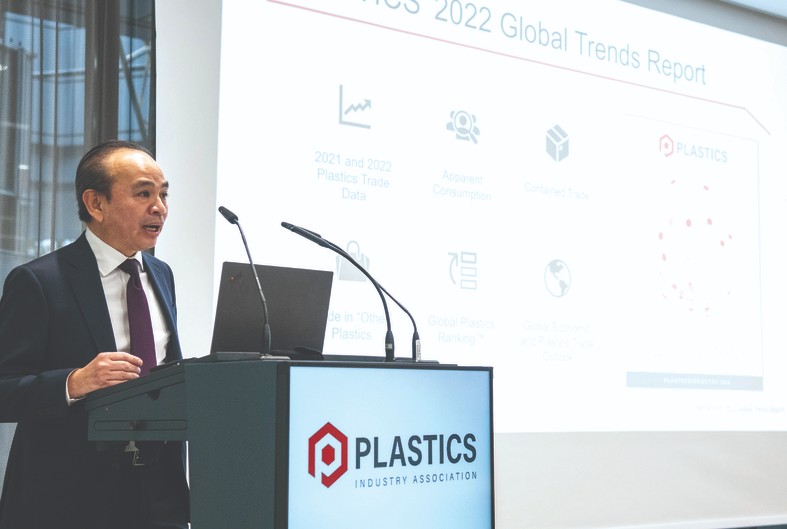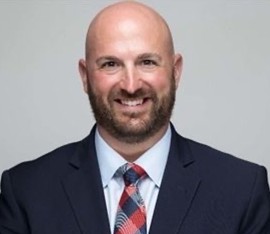Plastics Industry Association says tariff uncertainty could dent growt…
main text
Plastics Industry Association says tariff uncertainty could dent growth

Carolline Seidel
Plastics Industry Association Chief Economist Perc Pineda at K 2022.
While the U.S. plastics industry's economic performance was solid in 2024, it could see its shipments and employment contract slightly because of uncertainty over tariffs and trade policy, a U.S. industry association says.
At a Sept. 16 online briefing to release its 2025 Size and Impact Report, executives at the Plastics Industry Association pointed to good fundamentals but said uncertainty regarding tariffs and trade policy could hold back growth.
Perc Pineda, chief economist with the association, said the plastics industry could see the economic value of its shipments fall slightly.
"Because of the uncertainty that's holding back the manufacturing sector, the main customer of the plastics industry, we could see shipments in plastics manufacturing pull back by 0.5 percent," he said.
"By and large, what appears to be holding the manufacturing sector back are uncertainties tied to higher tariffs and the unpredictability of new and revised tariff measures," Pineda said. "As a consequence, plastics manufacturing employment could also decrease by 1.1 percent."
The report, which is a detailed look at 2024 economic data for different parts of the industry, said the total employment in the plastics industry rose 1.3 percent to 1.066 million in 2024.
The value of shipments also rose to $551 billion, a 0.2 percent increase from 2023.
It's the eighth-largest sector in U.S. manufacturing, and Pineda said the economic data points to solid underlying fundamentals. In both employment and shipments, plastics did better than manufacturing overall last year.
"We actually thrived in 2024 in spite of the interest rate-driven manufacturing slump," he said. "This tells me that there is plenty of room for the plastics industry to grow, considering that we are an impactful industry and we are vital to the U.S. economy."
But tariffs are clouding the outlook.

Seaholm
Seeking clarity
Matt Seaholm, the president and CEO of the association, said it hopes for more clarity around trade policy from Washington.
He said the association has been advocating for plastics machinery and materials to be seen as inputs for other manufacturing sectors, and as a result be given some tariff relief.
"I'm hopeful that there will be some recognition of plastics machinery and materials as a manufacturing input, and some tariff relief could ultimately be found in the coming year," Seaholm said.
Companies in the industry have been trying to manage the impact of President Donald Trump's administration's decision in August to expand steel tariffs to include the steel content of imported plastics machinery and molds, along with more than 400 other industrial products.
The U.S. plastics sector imports about 75 percent of its machinery.
Some industry groups, like the American Mold Builders Association, which represents plastic mold manufacturing companies, support the Trump administration's expanded steel tariffs.
Seaholm said companies are struggling with uncertainty in the economy and frustrated with shifts in trade policy.
"The frustrations virtually all industries are currently feeling about the dramatic shifts in American trade policies are hopefully only presenting short-term challenges and will eventually return to a norm that supports economic growth," Seaholm said.
"There are no doubt headwinds facing the industry and the economy," he said in opening comments on the webinar. "Uncertainty is always one of the biggest impediments to economic investment and growth, and uncertainty is abound. Interest rates, government spending, new regulations, consumer strength, sentiment toward plastics and yes, of course, tariffs and trade policy."
Pineda predicted that there will be some resolution to the steel and aluminum tariff debate because it's a key input to manufacturing.
"I think over time we will see a resolution to this issue, because I don't really think that the global trading environment could withstand continued higher cost of steel and aluminum," he said.
Seaholm did point to an economic boost from the large tax legislation that the Republican-controlled Congress passed and that Trump signed in July, in particular, from research and development tax credits and expensing provisions the industry lobbied for.
But he also said the impact of that law "to some degree … remains to be seen."
"What we saw get passed this summer, both from an R&D tax credit standpoint, as well as immediate expensing, really presents some tremendous opportunities for capital investment," Seaholm said. "That is, without a doubt, a huge win."
"But there's also the trade and tariff component to this that is certainly putting the pause on a lot of economic development and investment, and that push and pull is really creating a bit of, I guess, pause in the plastics industry investment," he said. "It's frustrating. I know our members are telling us that on a regular basis."
* Source : https://www.plasticsnews.com/news/association-says-tariff-uncertainty-pausing-plastic-investment
* Edit : HANDLER
- PreviousWOOJIN PLAIMM X K2025 Brochure_eng 25.10.02
- NextEuropean resin prices in a post-summer slump 25.09.21
